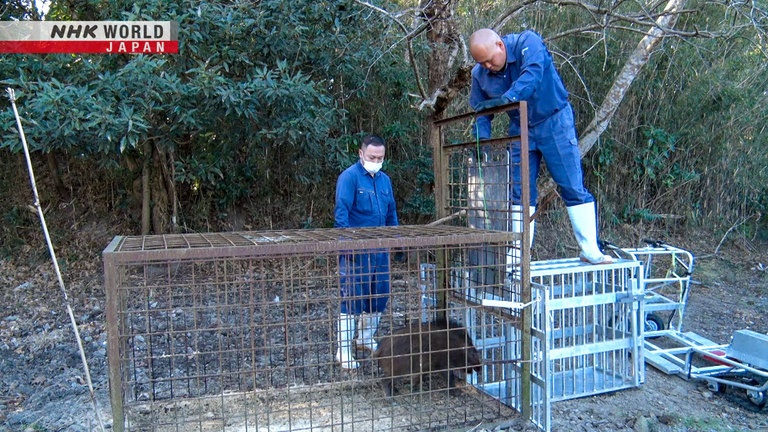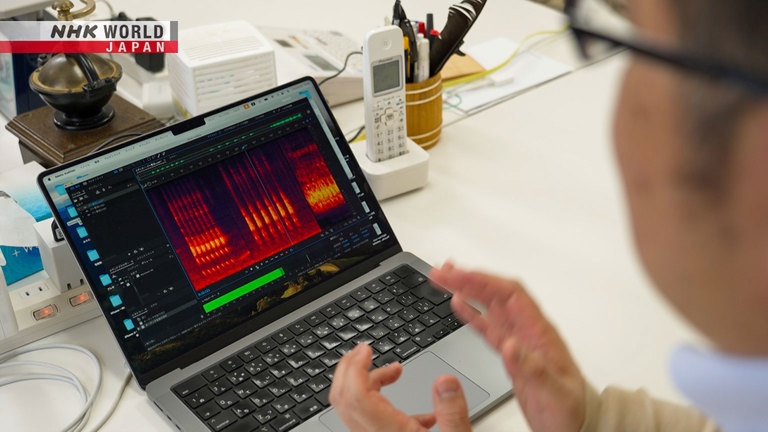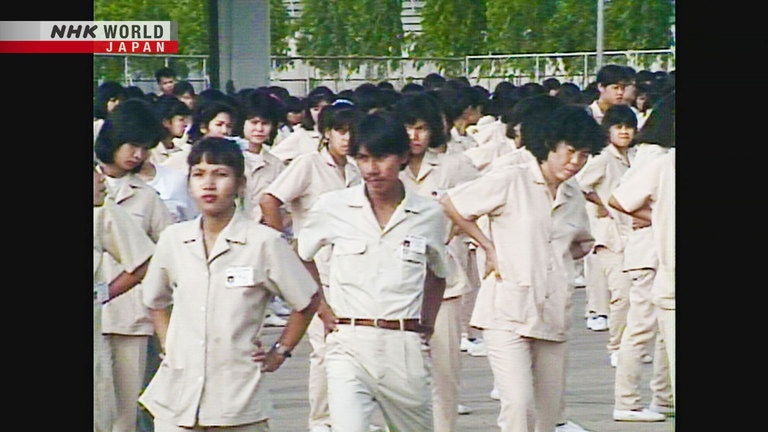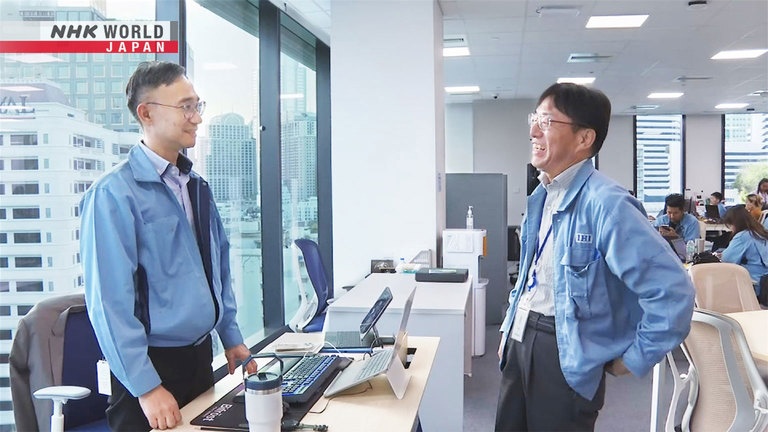Dealing with Damage-Causing Wildlife
[On-Site Report: Dealing with Damage-Causing Wildlife]
This episode features a security service company that helps farmers deal with damage-causing wildlife and a business that chases crows away with specially developed audio recordings.
*Subtitles and transcripts are available for video segments when viewed on our website.
On-Site Report: Dealing with Damage-Causing Wildlife

Employees from a major security service provider retrieve a wild boar from a farmer's trap

Years of research studying crow behavior and communication have led to a service that uses crow warning cries to scare them away
Global Trends: Japan Firms in Southeast Asia Losing Local Talent
With their offers of high salaries and good benefits, Japanese companies were once the employers of choice for many in Southeast Asia. We see how that's changing in Thailand in particular as local firms and new competitors step up their game to attract top talent.

Japanese companies expanded rapidly into Thailand and other parts of Southeast Asia in the 1980s, bringing with them offers of better pay and working conditions

Decades later, Japanese companies are finding it tough to retain local talent as the arrival of new competitors offers workers greater choice
In Focus: Group Scandals Threaten to Take Shine Off Toyota
Toyota Motor is selling more cars than any other automaker in the world and reaping record profits. But the champagne's not popping as a string of scandals at group firms continue to grab the headlines. How will a symbol of Japan's industrial power restore its reputation?
Transcript
Authorities conducted an inspection late last month at a facility of a Toyota affiliate in central Japan.
This was after Toyota Industries, a manufacturer of forklifts and automobile engines,
revealed that it had used falsified data for certification tests.
The finding forced the suspension of shipments of 10 Toyota vehicle models, including some popular SUVs.
"We are very sorry for causing such a great deal of trouble."
The head of the Transport Ministry overseeing the industry
said it will take strict measures based on the results of its investigation.
"This misconduct is extremely regrettable as it undermines the trust of industrial machinery and automobile users.
It also shakes the foundation of the auto certification system."
But that's not all.
There have been a series of scandals over fraudulent quality control within the Toyota group.
"We are deeply sorry."
In December last year, fully owned subsidiary Daihatsu Motor found widespread violations in safety tests going back decades.
Japan's top seller of mini vehicles was then ordered to halt shipments of all models in production.
The ministry has since allowed Daihatsu to resume shipments of some.
Another firm, Toyota's truck arm Hino Motors, had also acknowledged back in 2022
it submitted some improper data on emissions and fuel-efficiency.
So what went wrong?
Reports by independent investigation committees show possible causes
were a corporate culture in which workers are afraid to speak out,
and a lack of corporate governance among the group companies.
The panel probing Daihatsu says employees were subject to
"extreme pressure due to an excessively tight and rigid development schedule."
Toyota assumed full ownership of Daihatsu in 2016.
The panel adds, after this time, the push to speed up development schedules accelerated.
An auto expert says another root cause may be a fundamental change in the industry that is driving fierce competition.
"With the rapid global shift to electric vehicles,
emerging carmakers are utilizing artificial intelligence and robots to quickly develop cars.
They are aggressively marketing new models in a short period of time.
So traditional carmakers are also being forced to cut the time they take for development and manufacturing.
I think that's a big burden for them."
Toyota's chairman apologized for his group's scandals and vowed to bring about change.
"3 of our group companies did what is not supposed to be done.
So we have no choice but to push reforms with a determination in a way that totally rebuilds us."
The potential damage to brand reputation comes as traditional carmakers like Toyota
fight to maintain their place in a rapidly changing industry.
The group will need to come up with some convincing fixes to restore confidence.
A seminar for company managers was held in Bangkok last November.
The topic was why so many Thais are choosing to quit their jobs at Japanese companies.
"Many Thai people no longer want to brag about working for Japanese companies on social media."
There's a growing view that the firms are having difficulty attracting new talent...
and that their best employees are being poached by competitors.
"Many young employees have been quitting, and we don't know how to stop the trend."
Some local employees say they left Japanese companies because they feel it's difficult to get a promotion.
Phimchanok Suvichacherdchoo is one of them.
She had studied Japanese at Thailand's top university and landed a job with a major automaker based in Japan.
She worked as an interpreter in various negotiations
and continued to improve her language skills hoping to advance her career.
But her requests for advancement were never granted.
"I realized that I would not be promoted, no matter how hard I tried.
The company's criteria was seniority. It didn't consider my talents."
The speaker at the seminar has been following human resources trends in Southeast Asia.
He says Japanese companies there are struggling to stop the brain drain.
"Salaries at Japanese companies are so-so, but those who value their ideals and sense of fulfillment will fit in best.
I hope these kind of people will remain.
But they are already quitting. That's the biggest problem."
Efforts to address this are starting to take shape.
A subsidiary of a major machinery manufacturer is reducing the number of Japanese expatriates by half,
and increasing its roster of local managers.
It hired a Thai with experience at European and American multinationals for the No.2 slot at the subsidiary.
"There are now more and more opportunities for Thai people to build their career.
This new approach is likely to attract the people in the younger generation."
"Our ultimate goal is to create a Thai company run by Thai people to serve the local community.
Japanese employees will continue to provide support and coordinate efforts with the headquarters."
From now on, Chinese and South Korean companies are likely to set up more operations in Southeast Asia.
That means increased pressure for Japanese firms to reform their personnel policies.
In Japan, damage caused by wildlife is on the rise.
A security company is now providing assistance to local farmers.
And crows are being chased out of city centers with a unique audio-based method.
Today's On-Site Report features businesses that offer special services to help deal with damage-causing wildlife.
In Japan, wild boar and deer often eat and cause damage to crops before they can be harvested.
Fences and barriers do little to stop them.
Forced to get their own trapping licenses, many farmers must struggle to catch them on their own.
But that's just the start of their troubles.
The captured animals must be put down, transported to a designated area, and buried deep beneath the ground.
"A big boar can weigh 40-50kg, so dealing with it by myself these days is impossible!"
In response to this issue, a local subsidiary of a major security service provider started offering a pickup and disposal service.
At 7:00am, a call comes in from a local farmer.
"How big?"
"About 30kg?"
A wild boar that had been ravaging fields around the area had been caught in a local trap.
The well-trained employees were able to load up the boar in just a matter of minutes.
Even more impressive perhaps, is that the service is 100% free of charge.
"Crops that these farmers spent months of hard work to grow can be ruined in just one night.
So, these boars really are putting the farmer's livelihoods at risk.
But these are dangerous animals, so catching and getting rid of them, is not only a major burden, but also a safety risk.
As a security service provider, we feel that assisting and protecting local farmers is also one of our responsibilities."
The reason the company is able to offer this service for free,
is because of a game meat processing and sales business it started in 2020.
After being slaughtered, the boar is chilled for 24 hours.
A day later, the meat is cut, packaged, and labeled for sale.
The processing facility has adopted international food safety management standards
and has been certified by the Japanese government.
It currently sells deer and boar meat to 15 different shops and restaurants located throughout the country.
"While we may have no choice but to put these animals down,
at least we can show them some appreciation and respect by using the meat for food."
Offering up several dishes made from wild game,
this restaurant has been purchasing deer and boar meat from the company for the past two years.
"It's natural and delicious.
I think wild game meat truly reflects the unique flavors of a region.
So, I hope my customers can enjoy the best foods this area has to offer."
Sales aren't just limited to shops and restaurants.
The company recently began selling some of its game meats to a zoo in Chiba Prefecture
as food for carnivorous animals such as hyenas and lions.
Feeding them pieces of meat with the fur, skin, and bones still intact
contributes to their overall health as well as helps to reduce stress, through activating their natural feeding instincts.
With calls for help increasing, this financial year, the company estimates it will surpass 2,500 wildlife captures.
The city of Kumamoto is dealing with a major crow problem.
In 2018, a massive group of crows relocated their roost site to the city center.
Every night, over 10,000 crows gather on buildings and power lines and dirty the city with their excrement.
"We tried to scare them off with LED lights but that didn't prove to be effective at all.
In addition to the sanitary concerns we have with all of the droppings they leave,
we are also worried about it having a negative impact on our town's image!"
In order to deal with this foul problem, the city reached out to crow expert Tsukahara Naoki.
Having spent over 20 years conducting research on crows and their vocalizations,
he was inspired to try tackling crow-based problems after speaking with a local farmer.
"He was a fruit farmer, and the day before he was going to harvest,
a large group of crows flew in and ate up almost all of his fruit.
This single incident ended up putting him out of business.
Hearing that came as quite a shock to me."
Wanting to put his research to good use, Tsukahara launched a service that uses audio recordings of crows to chase them away.
The key to tricking the crows is to use a series of caws that tell a "story"
that reflects the standard dialogue that happens between crows when a threat is approaching.
"First, we hear one crow warning others of potential danger.
Another crow responds with increased urgency.
Lastly, many crows start cawing as a sense of impending danger spreads throughout the group."
Tsukahara edits together recordings to trick crows into thinking that danger is approaching.
Unlike other preventative methods which scare crows off temporarily,
Tsukahara hopes his method will permanently deter crows from returning to certain areas,
by making them believe that they are unsafe.
So far, the city of Kumamoto has installed 10 strategically located speakers where crows tend to congregate.
As the sun begins to set...
Thousands of crows descend upon the city center.
When the danger warnings are played...
A mass of crows fly off in a panic.
The recording is played at 10-minute intervals for three hours after the sun goes down.
To ensure that the crows don't become used to hearing the same warning cries being used repeatedly,
Tsukahara has created several variations, which he updates frequently.
Since implementing his system, the amount of bird droppings has been noticeably reduced
and officials estimate the number of crows has decreased from 12,000 to around 6,000.
"From the crows' perspective, they just want a place to be, but for the humans, they can be a major nuisance.
I hope we can find a middle ground where crows and humans can peacefully coexist."